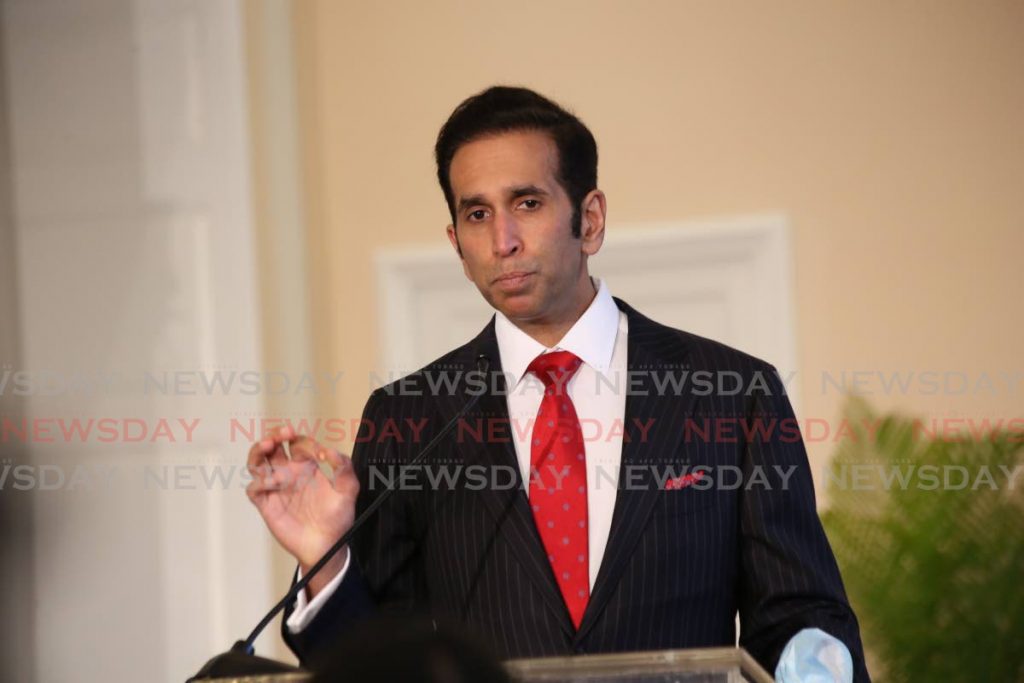[UPDATED] AG: Stricter emergency measures could come

ATTORNEY General Faris Al-Rawi warned that stricter measures could be applied if people do not adhere to regulations issued under the state of emergency (SoE).
Giving this warning at the Ministry of Health's virtual news conference on Monday, Al-Rawi said he empathised with people who are affected by restrictions such as no exercise in public.
After noting numerous comments being made about exercising in public, Al-Rawi said, "I would like to simply point out to the people of TT, do not be surprised, when one observes the mad rush of individuals, not in groups of five, all congregating in areas such as Chaguaramas, Lady Chancellor Hill, Palmiste Park, San Fernando's areas that we enjoy."
He continued, "One has to be conscious that it is the congregation of people, that we are managing. Therefore the advice that came to the Government and which was accepted and was introduced into the regulations, expert medical advice, is that we had to reduce circulation."
Al-Rawi said exercise is something important for everyone, and empathised with those affected..
"I can say that as a person that is a heavy exerciser, if I don't get my daily dose of exercise, my endorphins drop and I tend to tend towards depression. I want to get that physical training for clarity of mind.
"We all feel the same way."
He suggested that people exercise at home or in their yards.
He said the definition of "private dwelling," as stated in the state of emergency (SoE) regulations, also included the precincts of a person’s property. He said "private dwelling" was used because of the range of buildings people live in in Trinidad and Tobago.
“It can be a shack, a container, a mansion, a vehicle. The yard is an interesting concept. In TT, your private property is defined by your boundaries and your positions. The reason we didn’t go into 'the precincts' is that that is a matter for the TTPS, which can easily be interpreted.
“This is not an opportunity for smartmanism or smartwomanism, where people come into the dance and basically try to give you all the technical reasons why the law does not apply to them.
"The combination of the regulations basically says that those who are based in law enforcement can come...and ask you to disperse, return to your homes, they may charge you for an offence, because at the end of the day, the reasonableness of the law enforcement is going to be in question.
"While we know we live in a culture where people try to find loopholes and extensions for themselves, let us avoid technicalities. What we have to do is be very sensible to join in assisting the fight against covid."
Al-Rawi said this SoE differed from previous ones because it was called to deal with a public health crisis, while the others were called for issues of national security.
He said the regulations under the SoE could either be strengthened or relaxed as circumstances develop.
He said the public health regulations and the SoE regulations were both in effect.
He said number 8 of the SoE regulations said that a police officer may arrest without warrant anyone he reasonably suspects "has acted or is acting or is about to act in a manner prejudicial to public health, public safety or to public order or to have committed or is committing or is about to commit an offence against these regulations," and may take steps and use what he considers necessary force to arrrest them or prevent their escape.
“Reasonable suspicion is the standard of law that we’re well accustomed to. I want to remind you that even though we are under an SoE and the suspension of rights is arguable, that does not mean that the rights of TT stop. There are remedies and rights of redress to every citizen. In this law, we are preserving the jurisdiction of the court in every way possible. There’s no restriction on bail, against habeas corpus, that is, the right to be brought to court and say, tell me why I’m being imprisoned. That is not in these laws, in these regulations, even they were in every other regulations we looked at, including the 2011 regulations.”
Under the Constitution, Al-Rawi said, the SoE lasts for 15 days from the date of proclamation by the President. After that, the House of Representatives can approve an extension of the SoE for six months, by a simple majority vote.
Should there be a need to extend the SoE by another three months, Al-Rawi explained that three-fifths majority votes in both the House and the Senate are required.
Referring to reports that private labs had been carrying out covid19 testing without sending the results to the Health Ministry, Al-Rawi reminded that this is an offence under the public health regulations punishable by a fine of $250,000 and to imprisonment for six months.
“If any evidence of this sort of behaviour is in effect, there is a civic and important duty upon all of us to report these circumstances. This is criminal conduct and it must be met with precision, because it is fake news, poor management, and scandal that will effectively be the end of all of us.
"Let’s be serious about following the laws of TT, and if you have evidence of who has been reported to have done this, let’s act upon it. There’s anonymity in reporting, and let’s deal with the heart of this issue.”


Comments
"[UPDATED] AG: Stricter emergency measures could come"